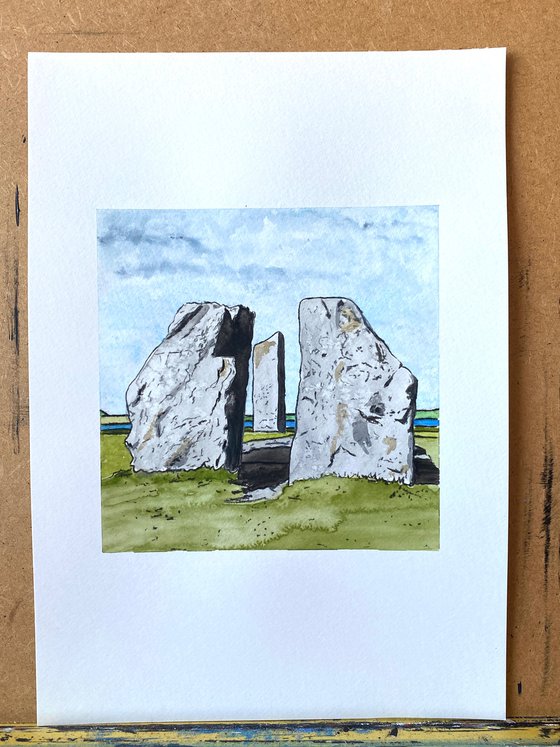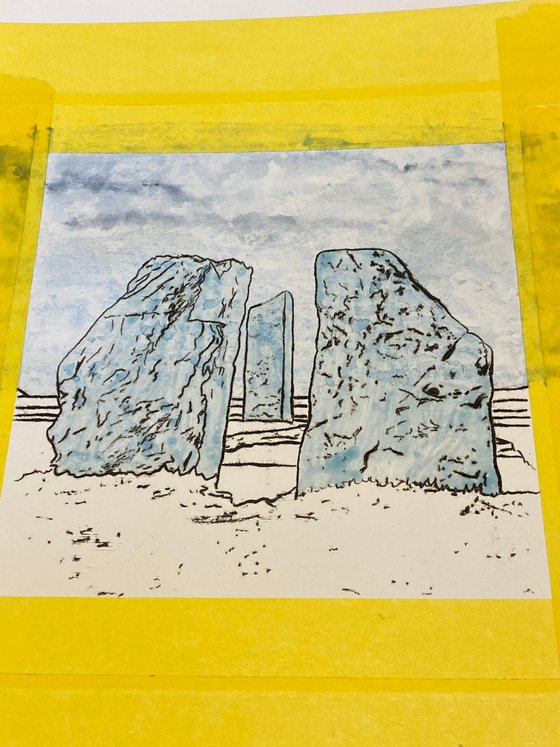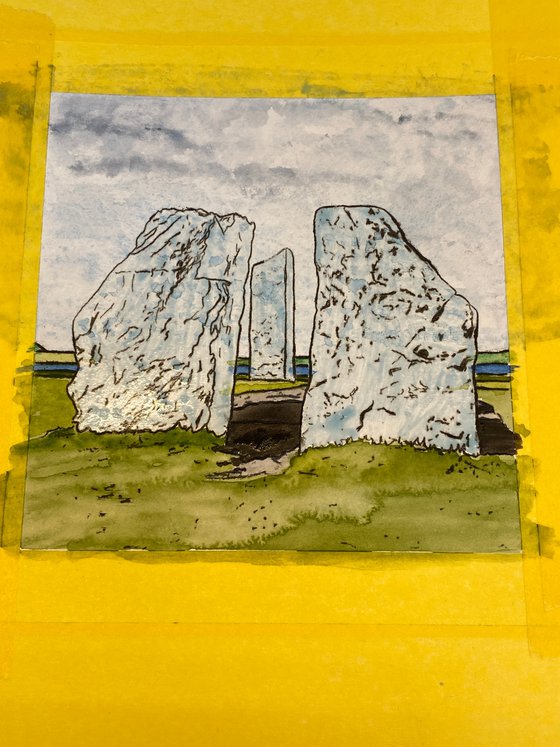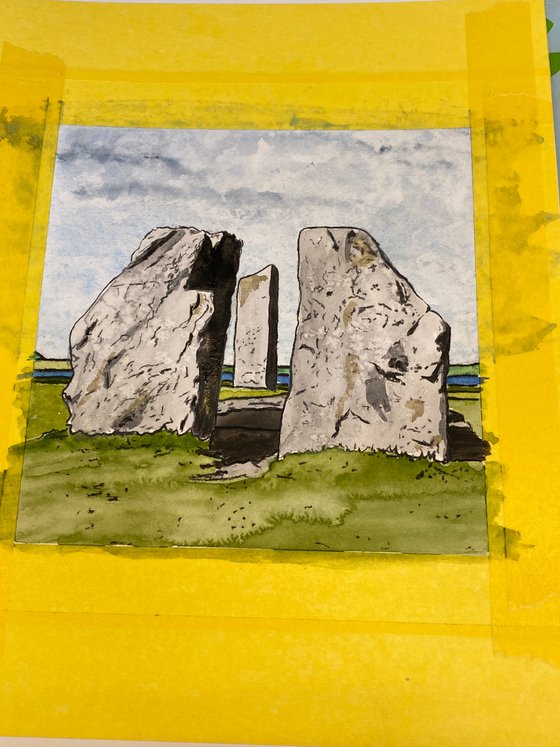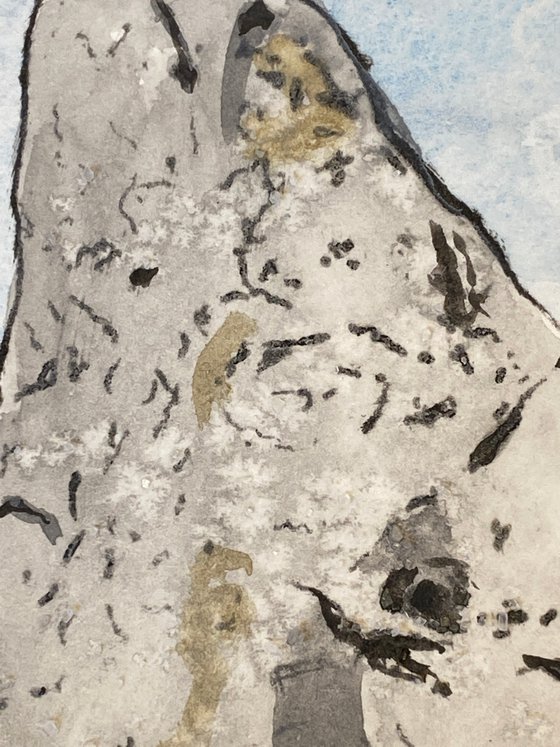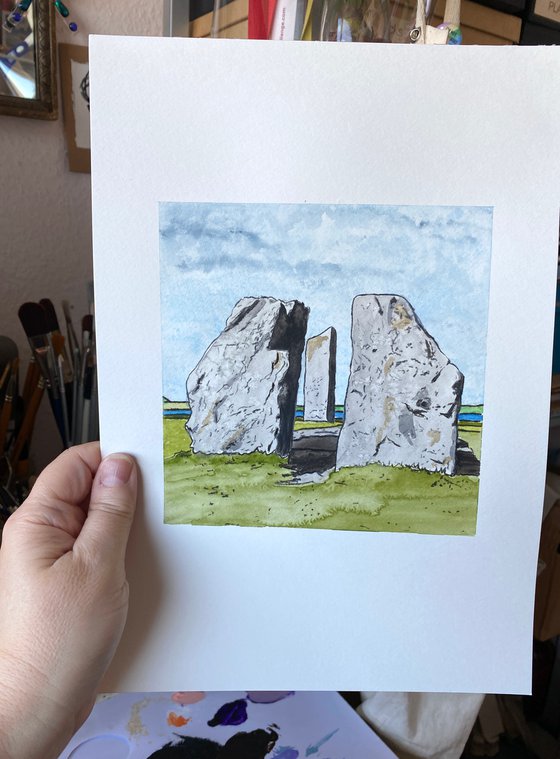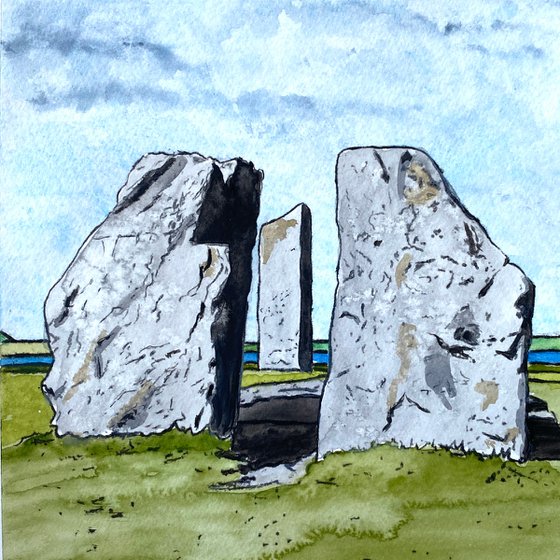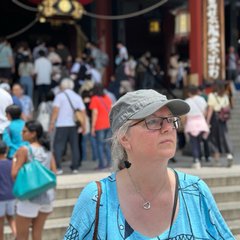Main Navigation
Original artwork description:
Before I became an artist I was an archaeologist and I still have a deep and abiding love for the monuments and structures of Neolithic Europe, especially those found in the UK, so I've embarked on a series of monoprints depicting these enigmatic landscape features.
The Standing Stones of Stenness could be the oldest stone circle in the British Isles. There were originally twelve stones, with some standing up to six metres high, focused on a large hearth in the centre. Although only four stones remain standing, it’s still possible to get a sense of the scale and importance of the area. The site is a Neolithic monument five miles northeast of Stromness on the mainland of Orkney, Scotland.
The surviving stones are sited on a promontory at the south bank of the stream that joins the southern ends of the sea loch Loch of Stenness and the freshwater Loch of Harray. The name, which is pronounced stane-is in Orcadian dialect, comes from Old Norse meaning stone headland. The stream is now bridged, but at one time was crossed by a stepping stone causeway, and the Ring of Brodgar lies about 1.2 km (0.75 mi) away to the north-west, across the stream and near the tip of the isthmus formed between the two lochs. Maeshowe chambered cairn is about 1.2 km (0.75 mi) to the east of the Standing Stones of Stenness and several other Neolithic monuments also lie in the vicinity, suggesting that this area had particular importance.
This artwork has been created using a monoprint process created by German artist Paul Klee where oil paint (black, in this case) is painted onto one side of a piece of paper which is then carefully placed, paint-side down, onto a piece of watercolour paper and the image required is drawn onto the unpainted side, thereby transferring black lines onto the watercolour paper. The first sheet is removed and the image can then be painted over using watercolours, with the black oil-painted lines acting as a resist. Due to the nature of the process, small black marks and smudges are frequently accidentally transferred but this, together with the watercolour painting, only highlights the individual nature of each ‘print’. While it is quite possible to produce the image again, each one will be different as no two paintings will ever be identical.
This image is transferred/outlined with Winsor & Newton oil paint and then painted with Winsor & Newton Professional watercolours onto 300gsm/140lb Hot Pressed Daler-Rowney Aquafine Smooth watercolour paper.
DELIVERY INFORMATION
In order to avoid trips to the Post Office, I shall be arranging for delivery to be via courier (not Hermes!) and shipping charges will reflect this. As prices will vary depending on the purchaser's location, if the actual shipping price is less than that charged, I will refund the difference. I am happy to arrange collection.
The high cost of shipping from the UK to the USA is, unfortunately, out of my hands and I won't cut corners by using the cheapest courier or not having insurance as that will just be tempting fate!
IMPORTANT - Rather sadly I've decided that, following Brexit, I can no longer sell my artwork to purchasers in the EU. The customs/VAT regulations are an absolute nightmare and I don't want to risk purchasers having to fork out a lot of unforeseen extra money when taking delivery, and even if I agree to pay Customs and VAT upfront before sending out, the red tape involved just looks horrendous.
I will still be selling to customers outside the EU as there's been no changes there so everything remains the same. My apologies, all I can say is that I voted to remain.
For international buyers please note that import duties, taxes and charges are not included in the price of this artwork or shipping costs. These charges are the buyer's responsibility.
Materials used:
oil paint, watercolours
Tags:
#printmaking #archaeology #standing stones #orkney #neolithic #ancient britain #ancient scotlandStones of Stenness III (2022) Monoprint
by Kaz Jones
31 Artist Reviews
£99
- Monoprint on Paper
- One of a kind artwork
- Size: 21 x 29.7 x 0.01cm (unframed) / 15 x 15.2cm (actual image size)
- Signed on the front
- Style: Impressionistic
- Subject: Landscapes, sea and sky
Loading
Original artwork description
Before I became an artist I was an archaeologist and I still have a deep and abiding love for the monuments and structures of Neolithic Europe, especially those found in the UK, so I've embarked on a series of monoprints depicting these enigmatic landscape features.
The Standing Stones of Stenness could be the oldest stone circle in the British Isles. There were originally twelve stones, with some standing up to six metres high, focused on a large hearth in the centre. Although only four stones remain standing, it’s still possible to get a sense of the scale and importance of the area. The site is a Neolithic monument five miles northeast of Stromness on the mainland of Orkney, Scotland.
The surviving stones are sited on a promontory at the south bank of the stream that joins the southern ends of the sea loch Loch of Stenness and the freshwater Loch of Harray. The name, which is pronounced stane-is in Orcadian dialect, comes from Old Norse meaning stone headland. The stream is now bridged, but at one time was crossed by a stepping stone causeway, and the Ring of Brodgar lies about 1.2 km (0.75 mi) away to the north-west, across the stream and near the tip of the isthmus formed between the two lochs. Maeshowe chambered cairn is about 1.2 km (0.75 mi) to the east of the Standing Stones of Stenness and several other Neolithic monuments also lie in the vicinity, suggesting that this area had particular importance.
This artwork has been created using a monoprint process created by German artist Paul Klee where oil paint (black, in this case) is painted onto one side of a piece of paper which is then carefully placed, paint-side down, onto a piece of watercolour paper and the image required is drawn onto the unpainted side, thereby transferring black lines onto the watercolour paper. The first sheet is removed and the image can then be painted over using watercolours, with the black oil-painted lines acting as a resist. Due to the nature of the process, small black marks and smudges are frequently accidentally transferred but this, together with the watercolour painting, only highlights the individual nature of each ‘print’. While it is quite possible to produce the image again, each one will be different as no two paintings will ever be identical.
This image is transferred/outlined with Winsor & Newton oil paint and then painted with Winsor & Newton Professional watercolours onto 300gsm/140lb Hot Pressed Daler-Rowney Aquafine Smooth watercolour paper.
DELIVERY INFORMATION
In order to avoid trips to the Post Office, I shall be arranging for delivery to be via courier (not Hermes!) and shipping charges will reflect this. As prices will vary depending on the purchaser's location, if the actual shipping price is less than that charged, I will refund the difference. I am happy to arrange collection.
The high cost of shipping from the UK to the USA is, unfortunately, out of my hands and I won't cut corners by using the cheapest courier or not having insurance as that will just be tempting fate!
IMPORTANT - Rather sadly I've decided that, following Brexit, I can no longer sell my artwork to purchasers in the EU. The customs/VAT regulations are an absolute nightmare and I don't want to risk purchasers having to fork out a lot of unforeseen extra money when taking delivery, and even if I agree to pay Customs and VAT upfront before sending out, the red tape involved just looks horrendous.
I will still be selling to customers outside the EU as there's been no changes there so everything remains the same. My apologies, all I can say is that I voted to remain.
For international buyers please note that import duties, taxes and charges are not included in the price of this artwork or shipping costs. These charges are the buyer's responsibility.
Materials used:
oil paint, watercolours
Tags:
#printmaking #archaeology #standing stones #orkney #neolithic #ancient britain #ancient scotland14 day money back guaranteeLearn more
